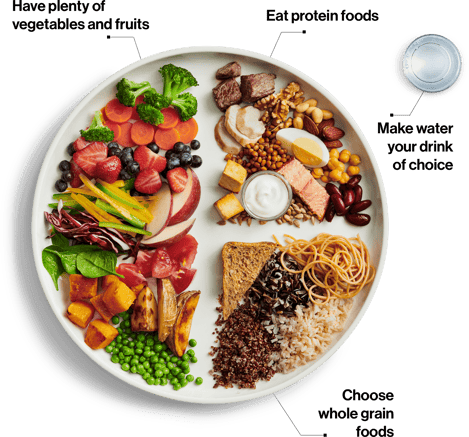As the world faces climate, health, and economic challenges, there is a growing focus on sustainable food consumption and production. An increasing number of consumers and dietitians are turning to plant-based options as a way to curb these concerns. In fact, a 2021 study found that over 40% of participants1 feel positively towards plant-based proteins and plant-based meat alternatives. Another study reveals that 33% of Canadians2 are already vegetarian or actively eating less meat.
The truth is that adding more plant-based options to your diet can have positive benefits for your health, your wallet, and the environment. Here is everything you need to know about increasing your plant-based food intake.
What’s the deal with plant-based foods?
Eating a variety of nourishing foods is the foundation for healthy eating and disease prevention. Health Canada even changed its Food Guide to reflect this. The recognizable rainbow of food servings has been replaced with a plate, helping Canadians visualize what it looks like to eat nutritious, balanced meals. Foods have been re-categorized as vegetables & fruits, whole grain carbohydrates, and protein foods.

Source: Canada’s Food Guide 2022
The new food guide also includes a lot more plant-based options. What does this mean? Foods that come from plants are more prominently featured than foods that come from animals. Eating more plant-based foods simply means adding more variety with vegetables, fruits, and whole grains, and choosing plant-based proteins more often. The latter is upheld by 82% of Canadian dietitians3.
Let’s be clear, adding more plant-based foods to your diet does not mean that you have to adopt a strict vegan lifestyle – unless you want to! But including more plant-based options can be a more sustainable way of eating in the long run.
Benefits of adding plant-based options to your diet
Health
Incorporating more plant-based foods increases the amount of fibre and unsaturated fats – or healthy fats – in your diet, while reducing the amount of saturated fats – unhealthy fats – and refined carbohydrates.
These changes, along with other lifestyle choices like physical activity, stress management, and good sleep, are essential to help:
-
Lower blood pressure
-
Improve cholesterol levels
-
Manage blood sugar levels
-
Regulate bowel movements
-
Better your mood
All these improvements can reduce the risk of heart disease, stroke, diabetes, some types of cancer, and support better mental health.
It’s important to be mindful about processed packaged foods that claim to be healthy or plant-based – like plant-based chips, cookies, and burgers. All foods, even processed and packaged foods, can be enjoyed in moderation. However, keep in mind that processed foods can contain more sodium, sugar, and other additives. For sustainable eating, make sure to enjoy your favourite foods while prioritizing whole foods that you prepare yourself.
Financial
With rising food prices in Canada and a predicted increase of 5% to 7% for 2022, we need to learn how to nourish our bodies in a way that is affordable and sustainable for each of us. In general, plant-based foods cost less than animal-based foods. Meat from animals and dairy products will likely cost more than a block of tofu or a bag of lentils. You can save on your grocery bill just by making some simple plant-based swaps when planning your meals for the week.
Take a look at the cost associated with a few common sources of protein:
-
1 kg ground beef: $12.46
-
1 kg chicken: $8.18
-
4L whole milk: $6.10
-
1 dozen eggs: $3.84
-
1 kg red lentils, kidney beans or chickpeas: $3.74
-
1 kg firm tofu: $5.94
The cost of vegetables and fruits is also rising. Maximize your grocery budget by:
-
Looking out for store specials and coupons
-
Buying produce that is in season and local
-
Opting for frozen and canned options
Environmental
When it comes to environmental impact, plant-based foods are often produced more sustainably than animal products. Foods that come from plants have a marked reduction in:
-
Carbon footprint and waste byproducts that contribute to greenhouse gas emissions
-
Water consumption
-
Soil and land use
Other contributors to the environmental impact of food, specifically greenhouse gas emissions, are:
-
Food waste
-
Food processing
-
Food packaging and transport
When shopping, try to find products that are produced locally, unprocessed or minimally processed, and without packaging or with reusable/recyclable packaging.
Sustainable steps for plant-based eating
Switching up your diet and including more plant-based options can lead to food waste if you don’t have a plan for how to prepare and eat those foods. Here are some practical tips to help incorporate new foods sustainably into your lifestyle and plan more plant-based meals:
-
Wash, chop, and refrigerate or freeze extra vegetables when preparing meals, so you’re ready for meals the next day.
-
Cut up some fruit and add it to your breakfast cereal, salads, and baked goods.
-
Reduce waste by eating vegetables that spoil faster (like leafy greens) first, and more robust ones (like broccoli or cauliflower) later in the week.
-
Be cautious of ultra-processed foods and food marketing – a good rule of thumb is to find foods with less packaging and with fewer ingredients.
-
Experiment with “meatless Mondays” or plan to have 1-2 plant-based meals per week.
-
Browse for recipes that are interesting to you, or ask family and friends for suggestions
-
Try a plant-based meal at a local restaurant to get inspired in your own kitchen.
Remember, it doesn’t have to be expensive, inconvenient, or complicated to benefit from eating more plant-based. Here are some easy-to-use plant-based foods you can add to your next grocery list:
-
Whole grains: quinoa, oats, brown or wild rice, bulgur, barley, whole-grain bread, and pasta
-
Fresh, frozen or canned fruits and vegetables: apples, oranges, pears, peaches, berries, carrots, leafy greens, beets, tomatoes, broccoli, cucumbers, and peppers
-
Plant proteins: chickpeas, lentils, kidney beans, tofu, nuts, and seeds
How Dialogue can help
If you would like to learn more about how to eat more plant-based foods that fit your unique palate and lifestyle, we can help. Dialogue has a team of skilled dietitians* who will work with you to create an eating strategy tailored to your needs. Learn how to incorporate more plant-based options in a delicious and nutritious way.
*Dietitians: additional service with fees may apply. Insurance receipts are provided.
Visit the Dialogue application and learn more about the services available to you.
Sources:
Alternative proteins, evolving attitudes
The role of plant-based foods in Canadian diets
Food and Mood: the Corresponsive Effect
Healthy eating and the environment
Monthly average retail prices for food and other selected products




 Canada (EN)
Canada (EN)
 Global (EN)
Global (EN)








